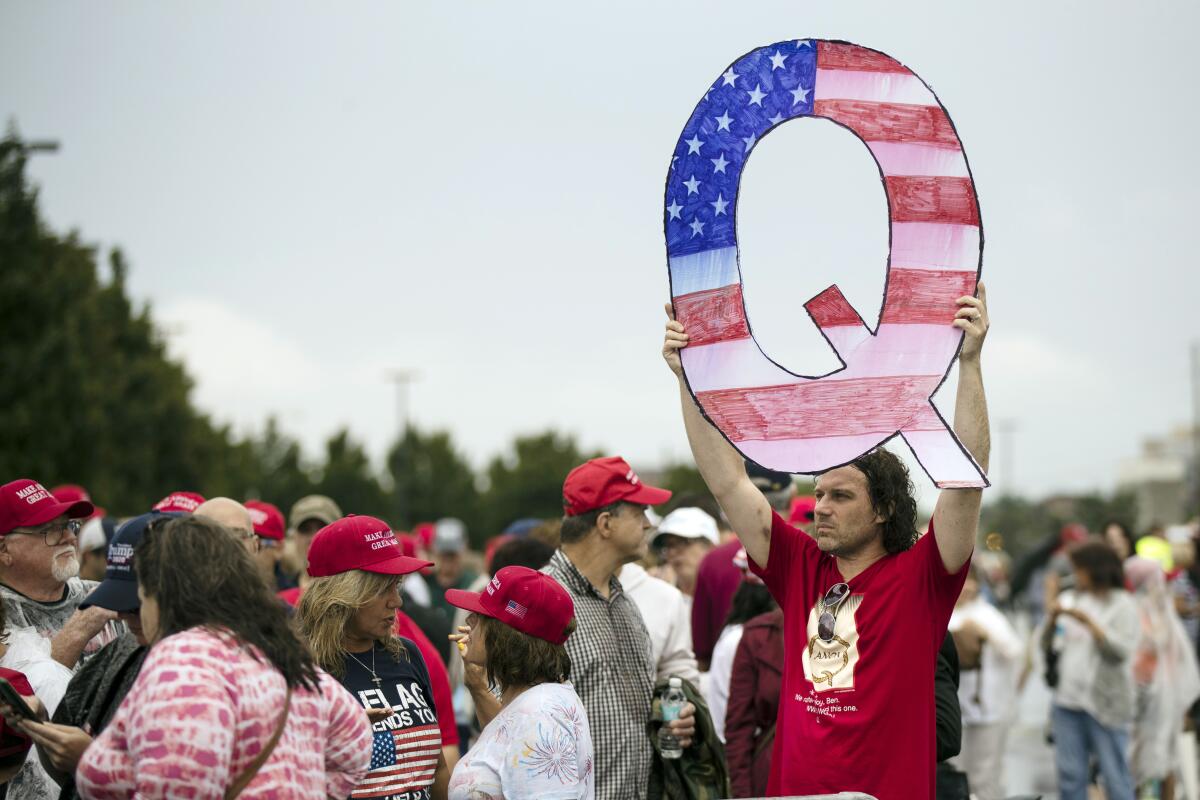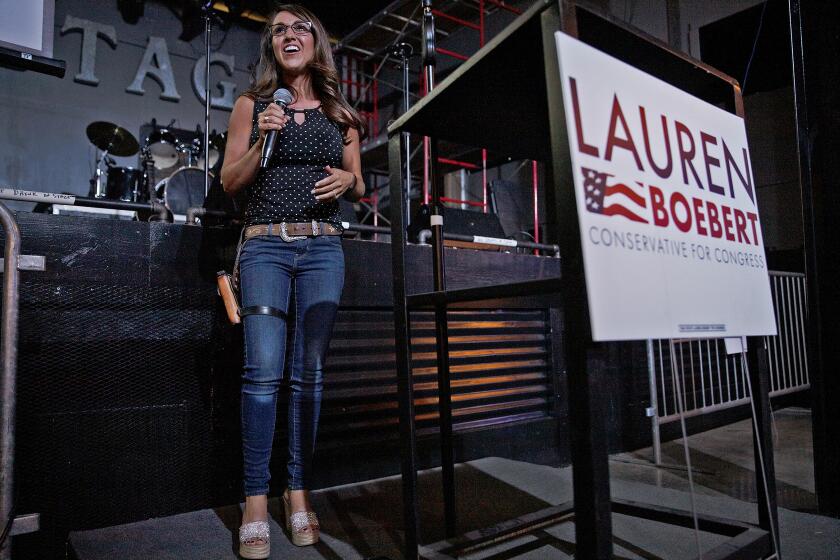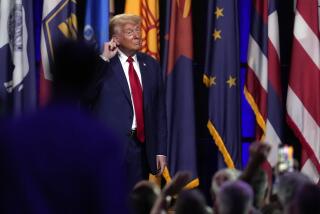Satanism and sex rings: How the QAnon conspiracy theory has taken political root

- Share via
A fringe theory that President Trump is at war with a global cabal of powerful, Satan-worshiping elites who control the world and run a child sex ring has shifted over the last three years from anonymous message boards to Trump rallies to the 2020 ballot.
More than 60 current and former congressional candidates have promoted or embraced the unfounded QAnon theory, according to a count by Media Matters, a left-leaning research site that tracks conservative media.
Though some of the candidates have gone viral over unproven claims — including the false theory that Beyoncé is pretending to be Black and weaves Satanic references into her music — few of them have any chance of being elected. The fraction of candidates linked to QAnon who have done well in competitive seats have distanced themselves from the theory.
“There is something about this political moment that emboldens these candidates to run,” said Joanne Miller, a University of Delaware associate professor who studies political psychology and conspiracy theories.
Although the QAnon community is still small — a March survey found that most Americans hadn’t even heard of it — it reflects the growing wave of anti-establishment sentiment that helped elect Trump. And the president’s own outsider status is what has endeared him to QAnon followers.
Trump is “a genuine Washington outsider, and what’s central to the QAnon community is the belief that the whole political system is corrupt,” said Travis View, a conspiracy theory researcher who co-hosts the QAnon Anonymous podcast, which breaks down QAnon’s various elements. “Only someone who was new to Washington could possibly help fix it.”
What is QAnon?
The QAnon conspiracy theory is founded on the belief that the world is run by a powerful group of evil politicians and celebrities including the Clintons, the Obamas, the Bushes, George Soros and Hollywood celebrities including Oprah Winfrey and Tom Hanks.
Trump fueled his political career with an unfounded ‘birther’ theory and now pushes ‘Obamagate’ and ‘treason.’ Here are some of his falsehoods on Obama.
QAnon followers believe President Trump is aware of this and is fighting against an entrenched “deep state” of bureaucrats within the government to bring them to justice. They call the moment when the Clintons and other members of the cabal will be arrested “The Storm,” a term inspired by an offhand comment Trump made during an October 2017 photo-op with high-ranking military officials and their spouses. “You guys know what this represents?” Trump asked the news media. “Maybe it’s the calm before the storm.”
The conspiracy theory has been laid out by an anonymous figure known as Q — likely a group of people — who leaves cryptic messages for his followers to decipher on the website 8kun (Q previously posted on 4chan and 8chan).
Q’s followers believe that, once they convince others, there will be a “Great Awakening.”
A Pew Research Center poll released in March found that 76% of Americans had heard nothing at all about QAnon, 20% had heard a little about it, and 3% had heard a lot.
Who is Q?
QAnon followers believe Q is a group of high-level military officials who support Trump, said View. He added that variations in Q’s tripcode (the unique set of numbers and letters that link posts by the same person on anonymous imageboard websites like 4chan) and writing style over the years suggest the identity of the people behind Q has changed over years.
Where did QAnon get its start?
In a sense, the basic tenets of the QAnon theory aren’t novel.
“As wacky as a pedophile deep state working against the president sounds, that’s the plot of Oliver Stone’s JFK movie from 30 years ago,” said Joseph Uscinski, an associate professor of political science at the University of Miami, where he studies why people believe in conspiracy theories. “There’s nothing new here.”
Less than a year before Q started posting, the unfounded Pizzagate theory took off. On Dec. 4, 2016, Edgar Maddison Welch drove from his home in North Carolina to the Comet Ping Pong pizzeria in Washington, D.C., where he was convinced children were being held captive as part of a sex trafficking ring organized by Democrats and Hillary Clinton.
Welch fired shots from an AR-15 semiautomatic rifle into a locked door. When he realized there was no evidence of a trafficking ring, he left his weapons in the store, walked out and was arrested. No one was harmed, and Welch was sentenced to four years in prison in June 2017.
On Oct. 28, 2017, the first Q drop was posted on 4chan, an anonymous imageboard known for harboring objectionable content. “HRC extradition already in motion effective yesterday with several countries in case of cross border run. Passport approved to be flagged effective 10/30 @ 12:01am,” Q wrote. “Expect massive riots organized in defiance and others fleeing the US to occur.”
There was no Clinton arrest, or riots. But Q has posted more than 4,500 messages since. The posts are filled with vague clues and questions (“Why does Potus surround himself w/ generals? What is military intelligence? Why go around the 3 letter agencies?” reads Q’s second post), and followers often rely on others to decode the messages.
“People don’t consume the Q drops directly,” said View. “They often rely upon these internet QAnon influencers who are called decoders. And these decoders, they purport that they are sort of able to understand and break down and demystify the Q drops for the laypeople who may have some trouble understanding what they mean.”
Why is Trump the central figure of the theory?
The president is an outsider, but he has also expressed an openness to unproven claims over the years, most notably that President Obama was not born in America.
View says that if a person believes Trump in the past has promoted conspiracy theories “because he has special insight into what’s the truth about reality that the mainstream media isn’t reporting on, then you might come to believe that he will continue to do that as president.”
QAnon supporters have been seen holding signs and wearing Q shirts at Trump rallies since 2018, and on several occasions over the last few years, the president has retweeted accounts that promote the theory.
But the Trump administration has rarely acknowledged the theory directly. After QAnon supporters attended a July 2018 Trump rally in Tampa, Fla., former White House Press Secretary Sarah Huckabee Sanders said the president “condemns and denounces any group that would incite violence against another individual, and certainly doesn’t support groups that would promote that type of behavior.”
Will there be a QAnon delegation in Congress?
No. Of the dozens of candidates who appear to have promoted or embraced the theory, Marjorie Taylor Greene of Georgia and Lauren Boebert of Colorado appear to have the best shot at winning in November. Both have either publicly distanced themselves from the movement or refused to discuss their past support as their campaigns have progressed.
“There’s no evidence at all that the fact that these candidates won has anything to do with Q,” Miller said.
Greene came in first in the Republican primary for the congressional seat made available by Republican Rep. Tom Graves’ retirement but fell short of wining 50% of the vote. If her advantage holds in the Aug. 11 runoff election, she’ll almost certainly win the Republican-leaning district in the November general election.
Greene called Q a “patriot” in a 2017 video about the figure that was posted on YouTube by a third party. “I think that so many Americans are blind, and when they hear these stories about pedophiles, and they hear these stories about Satanic worship, they don’t want to believe it’s true,” she said in the video.
Greene did not respond to a request for comment. In a statement to the Washington Post, the candidate did not directly address her QAnon comments, but called the outlet “fake news.” Several high-ranking congressional Republicans denounced Greene after Politico reported she’d made several racist comments in Facebook videos.
Boebert rose to prominence after she challenged former Democratic presidential candidate Beto O’Rourke at an event in Aurora over his remark, during a presidential debate, that his administration would take people’s AR-15s and AK-47s. Boebert, a resident of Rifle, Colo., is known locally for her restaurant Shooters, where waitresses open carry guns. Boebert reopened the restaurant during the coronavirus pandemic in defiance of state health orders.
A small but growing number of Republican congressional candidates have links to the far-right conspiracy theory known as QAnon.
During a May 2020 appearance on a pro-QAnon YouTube channel, Boebert said she’d heard of the theory from her mother, whom she described as a “little fringe,” but said she hoped it was true. After she beat Republican Rep. Scott Tipton in the primary and faced attacks from the Democratic Congressional Campaign Committee, she backed away from the theory.
Tipton, who was endorsed by Trump, had been favored to win reelection in the Republican-leaning seat. Boebert faces an uphill climb. As of June 10, she had raised $133,000. Her Democratic opponent, Diane Mitsch Bush, has raised nearly $1 million.
More to Read
Get the L.A. Times Politics newsletter
Deeply reported insights into legislation, politics and policy from Sacramento, Washington and beyond. In your inbox twice per week.
You may occasionally receive promotional content from the Los Angeles Times.









